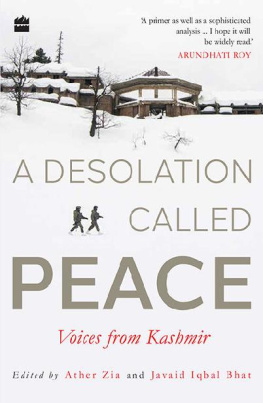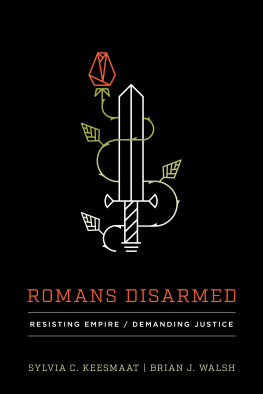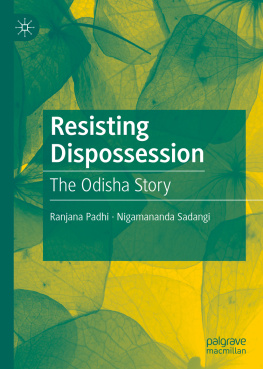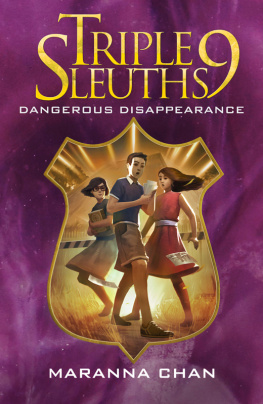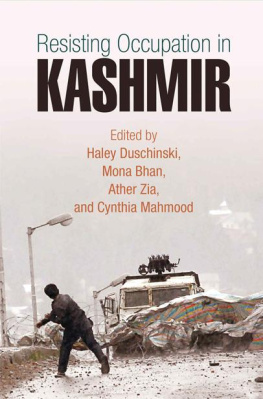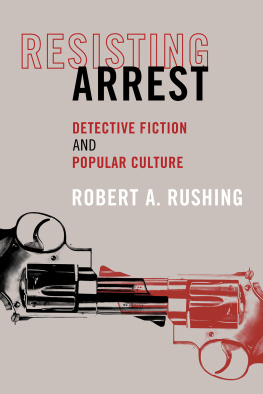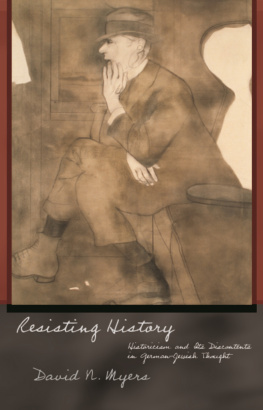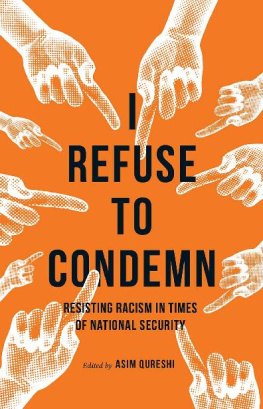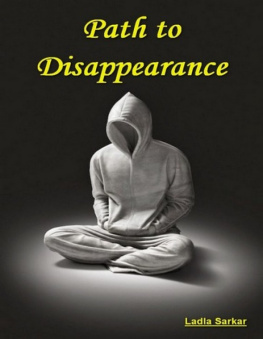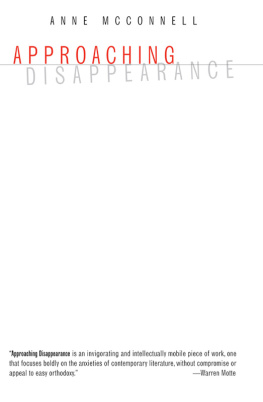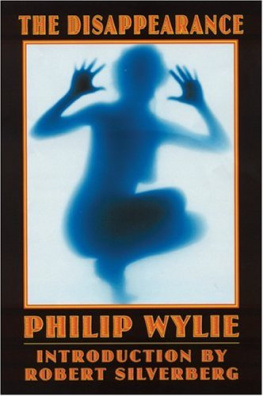Ather Zia - Resisting Disappearance
Here you can read online Ather Zia - Resisting Disappearance full text of the book (entire story) in english for free. Download pdf and epub, get meaning, cover and reviews about this ebook. year: 2020, publisher: Zubaan Publishers Pvt. Ltd 2020, genre: Politics. Description of the work, (preface) as well as reviews are available. Best literature library LitArk.com created for fans of good reading and offers a wide selection of genres:
Romance novel
Science fiction
Adventure
Detective
Science
History
Home and family
Prose
Art
Politics
Computer
Non-fiction
Religion
Business
Children
Humor
Choose a favorite category and find really read worthwhile books. Enjoy immersion in the world of imagination, feel the emotions of the characters or learn something new for yourself, make an fascinating discovery.

Resisting Disappearance: summary, description and annotation
We offer to read an annotation, description, summary or preface (depends on what the author of the book "Resisting Disappearance" wrote himself). If you haven't found the necessary information about the book — write in the comments, we will try to find it.
Resisting Disappearance — read online for free the complete book (whole text) full work
Below is the text of the book, divided by pages. System saving the place of the last page read, allows you to conveniently read the book "Resisting Disappearance" online for free, without having to search again every time where you left off. Put a bookmark, and you can go to the page where you finished reading at any time.
Font size:
Interval:
Bookmark:

Military Occupation and Womens Activism in Kashmir


ZUBAAN
128-B Shahpur Jat
First Floor
New Delhi 110049
Email:
Website: www.zubaanbooks.com
First published by University of Washington Press 2020
This edition published by Zubaan Publishers Pvt. Ltd 2020
Copyright University of Washington Press 2020
All rights reserved
For sale in South Asia only
Zubaan is an independent feminist publishing house based in New Delhi, India with a strong academic and general list. It was set up as an imprint of the well known feminist house Kali for Women, and carries forward Kalis tradition of publishing world quality books to high editorial and production standards. Zubaan means tongue, voice, language, speech in Hindustani. Zubaan is a non-profit publisher, working in the areas of the humanities and social sciences, as well as in fiction, general non-fiction, and books for young adults that celebrate difference, diversity and equality for and about the children of India and South Asia under its imprint Young Zubaan.
Print ISBN: 9789385932984
eBook ISBN: 9788194760580
To my homeland, Kashmir, and its people, who make life possible under shadow of death
For Hussaina, whose last words continue to ring: Kaem che karin [We have to continue the work].
I am eternally indebted to all the activists of the Association of Parents of Disappeared Persons (APDP) and other research partners who opened their hearts and homes to make this book possible. I could not have written this without the generous participation of Parveena Ahangar, Hussaina Bano, Mogal Maas, Naseema Bano, Bilquees Manzoor, Tahira Begum, Shabir Mir, Jabbar Sharief, and many others whose names I cannot mention for their safety as well as lack of space here. I cannot thank Parvez Imroz and Khurram Parvez enough for their friendship and insight and for relinquishing precious space in their small office for this research. I could not have done much without the support of the staff of both APDP groups, especially Meraj Ahmed and Sabia Dar, who made sure I did not want for anything, including information, tea, and even at times keeping my children entertained.
Professor Victoria Bernal, my mentor in the Department of Anthropology at the University of CaliforniaIrvine, gave shape to my ideas and restored my confidence whenever I faltered. I have also been the lucky recipient of compassionate guidance from Professors Karen Leonard, Susan Coutin, and Gabriele Schwab. For their umpteen pep talks, I am indebted to Professors Leo Chavez, Angela Garcia, Michael Montoya, Julia Elyachar, and Tom Boellstorf. My 2008 anthropology cohort at Irvine, who became a family to me, cheered me on. Thanks are due to my best friend, Michael Hurley, who constantly reminded me that he saw a book taking shape, and I believed him. My gang of mothers at Palo Verde graduate housing Valeriya, Citi, Stephanie, Lauren, Melanie, Antonia, and Rakhireplenished my confidence in building this project while raising young children.
For the funding of this project, thanks are due the Human Rights Center at the University of CaliforniaBerkeley, the Wenner Gren Foundation, the American Association of University Women, the International Peace Research Association Foundation, and the University of Northern ColoradoGreeleys Research Dissemination and Faculty Development Grant. Additional thanks are due for numerous intramural grants at UCIrvine, notably from the Center for Citizen Peacebuilding, the Center for Asian Studies, the Center for Global Peace and Conflict Studies, the Associate Deans Writing Fellowship, and the Dard Magnus Writing Fellowship, as well as an award from International Phi Beta Kappa.
My grandfather Gulam Ahmed Lone nurtured me spiritually to undertake a project of this magnitude. His inspirational life, his teachings, and his prayers remain my guiding compass on this earth. My parents, Syed Mir Abdul Gani and Zubaida Ahmed Lone, believe unconditionally in my dreamsthe greatest gift any curious child can have. I thank my parents-in-law, Abdul Latif and Khalida Latif, for their presence. My husband, Vaseem Lone, has been a constant refuge and companion. Our children, Fatima Ahmed and Ali Ziyad, who grew up with this project, have been fellow travelers rather than children who only needed nurture. Tasneem Khan, Rafique Khan, and Shama Hussain are the greatest additions to my life; in their gentle grace I have found a home away from home.
I am indebted to the prayers and inspiration of my siblings and cousins, especially Mathora Masoom, Syed Zubair, and Idrees Lone. With gentle guidance, kind nurturing, and unwavering confidence in the project, my friend Munib Malik has been with me every inch of the way. Javeed Ahmed, Showkat Khaliq, Peer Gulam Rasool, Parvaiz Bukhari, Shuja, Rafiq Peer-zada, Javaiq Iqbal, and few friends who prefer to remain anonymous have given me the gift of their love, time, conversation, always honing my understanding and enriching my life. I owe more than gratitude to my kindred Anjali Nath for the wellspring of her unconditional love, insightful conversations, and feedback to bring this book to culmination. For nurturing me, reading drafts, giving feedback, and fostering together the Critical Kashmir Studies Collective as this project progressed, I express thanks for my comrades-in-arms Haley Duschinski, Mona Bhan, Deepti Misri, and Hafsa Kanjwal. I am thankful for Nosheen Alis gift of unique poetic friendship, and for Cabeiri deBergh Robinson, who offered sage guidance at every step. Suvir Kaul deserves huge thanks for becoming my nonanonymous reviewer and challenging my thinking in ways that benefited the book. Thanks are due to my friends and colleagues at UNCGreeley, Sally McBeth, Chris Talbot, Trish Jolly, Britney Kyle, Whitney Duncan, and Laura Connolly for their love and support.
I have been fortunate to have as my editors Larin McLaughlin and Piya Chatterjee at the University of Washington Press. They believed in the project and its cause from the start, and throughout this journey they have become my friends. I have benefited from conversations with many dear fellow travelers, including Angana Chatterji, Amrita Ghosh, Huma Dar, and Mohammad Junaid, to name just a few. Last but not least, I must thank Yawar Nazir Kabli, who generously offered his work, which complements the ethnography meaningfully. It has taken a village to raise this book. All merits of this project belong to those I have named as well as to those who prefer to remain unmentioned here but are always in my heart. All shortcomings herein remain my own.
| Frontispiece Unending protest: | Parveena Ahangar with senior activists Hajra Begum and Rehat Begum |
| Page xvii | Map of Kashmir [not included in this edition] |
| Preceding introduction | APDP activists in a protest |
| Preceding chapter 1 | An APDP activist touching a banner with pictures of the disappeared men |
| Preceding chapter 2 | An activist under surveillance |
| Preceding chapter 3 | APDP activists protest surrounded by government forces and media |
| Preceding chapter 4 | APDP activists in a protest sharing grief |
| Preceding chapter 5 | Banner with sketches of the disappeared under the shadow of a soldiers gun |
Font size:
Interval:
Bookmark:
Similar books «Resisting Disappearance»
Look at similar books to Resisting Disappearance. We have selected literature similar in name and meaning in the hope of providing readers with more options to find new, interesting, not yet read works.
Discussion, reviews of the book Resisting Disappearance and just readers' own opinions. Leave your comments, write what you think about the work, its meaning or the main characters. Specify what exactly you liked and what you didn't like, and why you think so.

